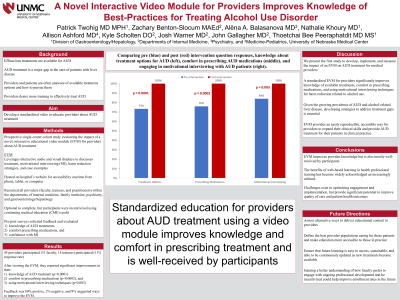Monday Poster Session
Category: Liver
P2435 - A Novel Interactive Video Module for Providers on Treating Alcohol Use Disorder: The Treatment Education for Alcohol Misuse (TEAM) Study
Monday, October 23, 2023
10:30 AM - 4:15 PM PT
Location: Exhibit Hall

Has Audio

Patrick Twohig, MD, MPH
University of Nebraska Medical Center
Rochester, NY
Presenting Author(s)
Patrick Twohig, MD, MPH, Zachary Benton-Slocum, MEd, Alëna A. Balasanova, MD, Nathalie Khoury, MD, Allison Ashford, MD, Kyle Scholten, DO, Josh Warner, MD, John Gallagher, MD, Thoetchai Peeraphatdit, MD
University of Nebraska Medical Center, Omaha, NE
Introduction: Alcohol-associated liver disease (ALD) is the most common reason for liver transplantation in the United States. Despite the availability of efficacious treatment for alcohol use disorder (AUD), very few patients are offered treatment. Studies have shown that providers lack knowledge and desire more training to effectively treat AUD. The aim of this study is to develop a video module to improve providers’ knowledge regarding AUD treatment.
Methods: Prospective single-center cohort study evaluating the impact of a novel, interactive educational video module (EVM) for providers about AUD treatment. The EVM discussed the epidemiology of AUD, pharmacologic and psychosocial treatment options, motivational interviewing strategies, and case examples. The EVM was optional to complete, hosted on our hospital’s website, and available to all providers (faculty, trainees, and practitioners) within the departments of internal medicine (IM), family medicine (FM), psychiatry, and gastroenterology/hepatology. As incentive to participate, providers received continuing medical education (CME) credit after completing the ~15-minute EVM. We used pre/post surveys to evaluate providers 1) knowledge of AUD treatments, 2) comfort prescribing AUD medications, and 3) confidence with motivational interviewing. We also solicited feedback on the EVM. Matched responses were evaluated using paired t-tests.
Results: Forty-five providers participated (31 faculty, 14 trainees). After viewing the EVM, providers reported statistically significant improvements in their knowledge of AUD treatment options (p=0.0001), comfort in prescribing AUD medications (p=0.0002) and using motivational interviewing techniques (p=0.003) when compared to the pre-intervention survey (Figure 1). All providers (100%) thought the EVM was based on best-practices, 91% thought it was effectively delivered, and 100% thought it was free of commercial bias. Feedback on the EVM was 89% positive, 2% negative, and 9% suggested ways to functionally optimize the EVM.
Discussion: Standardized EVM on AUD treatment can significantly improve provider knowledge and comfort in treating AUD. Nearly all providers found the EVM beneficial. Further studies are needed to evaluate whether EVM can lead to increased treatment access and better outcomes for patients with AUD.

Disclosures:
Patrick Twohig, MD, MPH, Zachary Benton-Slocum, MEd, Alëna A. Balasanova, MD, Nathalie Khoury, MD, Allison Ashford, MD, Kyle Scholten, DO, Josh Warner, MD, John Gallagher, MD, Thoetchai Peeraphatdit, MD. P2435 - A Novel Interactive Video Module for Providers on Treating Alcohol Use Disorder: The Treatment Education for Alcohol Misuse (TEAM) Study, ACG 2023 Annual Scientific Meeting Abstracts. Vancouver, BC, Canada: American College of Gastroenterology.
University of Nebraska Medical Center, Omaha, NE
Introduction: Alcohol-associated liver disease (ALD) is the most common reason for liver transplantation in the United States. Despite the availability of efficacious treatment for alcohol use disorder (AUD), very few patients are offered treatment. Studies have shown that providers lack knowledge and desire more training to effectively treat AUD. The aim of this study is to develop a video module to improve providers’ knowledge regarding AUD treatment.
Methods: Prospective single-center cohort study evaluating the impact of a novel, interactive educational video module (EVM) for providers about AUD treatment. The EVM discussed the epidemiology of AUD, pharmacologic and psychosocial treatment options, motivational interviewing strategies, and case examples. The EVM was optional to complete, hosted on our hospital’s website, and available to all providers (faculty, trainees, and practitioners) within the departments of internal medicine (IM), family medicine (FM), psychiatry, and gastroenterology/hepatology. As incentive to participate, providers received continuing medical education (CME) credit after completing the ~15-minute EVM. We used pre/post surveys to evaluate providers 1) knowledge of AUD treatments, 2) comfort prescribing AUD medications, and 3) confidence with motivational interviewing. We also solicited feedback on the EVM. Matched responses were evaluated using paired t-tests.
Results: Forty-five providers participated (31 faculty, 14 trainees). After viewing the EVM, providers reported statistically significant improvements in their knowledge of AUD treatment options (p=0.0001), comfort in prescribing AUD medications (p=0.0002) and using motivational interviewing techniques (p=0.003) when compared to the pre-intervention survey (Figure 1). All providers (100%) thought the EVM was based on best-practices, 91% thought it was effectively delivered, and 100% thought it was free of commercial bias. Feedback on the EVM was 89% positive, 2% negative, and 9% suggested ways to functionally optimize the EVM.
Discussion: Standardized EVM on AUD treatment can significantly improve provider knowledge and comfort in treating AUD. Nearly all providers found the EVM beneficial. Further studies are needed to evaluate whether EVM can lead to increased treatment access and better outcomes for patients with AUD.

Figure: Figure 1: Comparing pre (blue) and post (red) intervention question responses, knowledge about treatment options for AUD (left), comfort in prescribing AUD medications (middle), and engaging in motivational interviewing with AUD patients (right).
Disclosures:
Patrick Twohig: Bausch Health – Grant/Research Support.
Zachary Benton-Slocum indicated no relevant financial relationships.
Alëna Balasanova indicated no relevant financial relationships.
Nathalie Khoury indicated no relevant financial relationships.
Allison Ashford indicated no relevant financial relationships.
Kyle Scholten indicated no relevant financial relationships.
Josh Warner indicated no relevant financial relationships.
John Gallagher indicated no relevant financial relationships.
Thoetchai Peeraphatdit indicated no relevant financial relationships.
Patrick Twohig, MD, MPH, Zachary Benton-Slocum, MEd, Alëna A. Balasanova, MD, Nathalie Khoury, MD, Allison Ashford, MD, Kyle Scholten, DO, Josh Warner, MD, John Gallagher, MD, Thoetchai Peeraphatdit, MD. P2435 - A Novel Interactive Video Module for Providers on Treating Alcohol Use Disorder: The Treatment Education for Alcohol Misuse (TEAM) Study, ACG 2023 Annual Scientific Meeting Abstracts. Vancouver, BC, Canada: American College of Gastroenterology.
